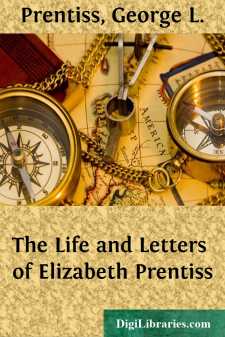Categories
- Antiques & Collectibles 13
- Architecture 36
- Art 48
- Bibles 22
- Biography & Autobiography 813
- Body, Mind & Spirit 142
- Business & Economics 28
- Children's Books 15
- Children's Fiction 12
- Computers 4
- Cooking 94
- Crafts & Hobbies 4
- Drama 346
- Education 46
- Family & Relationships 57
- Fiction 11828
- Games 19
- Gardening 17
- Health & Fitness 34
- History 1377
- House & Home 1
- Humor 147
- Juvenile Fiction 1873
- Juvenile Nonfiction 202
- Language Arts & Disciplines 88
- Law 16
- Literary Collections 686
- Literary Criticism 179
- Mathematics 13
- Medical 41
- Music 40
- Nature 179
- Non-Classifiable 1768
- Performing Arts 7
- Periodicals 1453
- Philosophy 64
- Photography 2
- Poetry 896
- Political Science 203
- Psychology 42
- Reference 154
- Religion 513
- Science 126
- Self-Help 84
- Social Science 81
- Sports & Recreation 34
- Study Aids 3
- Technology & Engineering 59
- Transportation 23
- Travel 463
- True Crime 29
The Life and Letters of Elizabeth Prentiss
Description:
Excerpt
CHAPTER I.
THE CHILD AND THE GIRL.
1818-1839.
I. Birth-place and Ancestry. Seth Payson. Edward Payson. His Mother. A
Sketch of his Life and Character. The Fervor of his Piety. Despondent
Moods and their Cause. Bright, natural Traits. How he prayed and
preached. Conversational Gift. Love to Christ. Triumphant Death.
Mrs. Prentiss was fortunate in the place of her birth. She first saw the light at Portland, Maine. Maine was then a district of Massachusetts, and Portland was its chief town and seaport, distinguished for beauty of situation, enterprise, intelligence, social refinement and all the best qualities of New England character. Not a few of the early settlers had come from Cape Cod and other parts of the old Bay State, and the blood of the Pilgrim Fathers ran in their veins. Among its leading citizens at that time were such men as Stephen Longfellow, Simon Greenleaf, Prentiss Mellen, Samuel Fessenden, Ichabod Nichols, Edward Payson, and Asa Cummings; men eminent for private and public virtue, and some of whom were destined to become still more widely known, by their own growing influence, or by the genius of their children.
But while favored in the place of her birth, Mrs. Prentiss was more highly favored still in her parentage. For more than half a century the name of her father has been a household word among the churches not of New England only, but throughout the land and even beyond the sea. It is among the most beloved and honored in the annals of American piety. [1] He belonged to a very old Puritan stock, and to a family noted during two centuries for the number of ministers of the Gospel who have sprung from it. The first in the line of his ancestry in this country was Edward, who came over in the brig Hopewell, William Burdeck, Master, in 1635-6, and settled in the town of Roxbury. He was a native of Nasing, Essex Co., England. Among his fellow-passengers in the Hopewell was Mary Eliot, then a young girl, sister of John Eliot, the illustrious "Apostle to the Indians." Some years later she became his wife. Their youngest son, Samuel, was father of the Rev. Phillips Payson, who was born at Dorchester, Massachusetts, 1705, and settled at Walpole, in the same State, in 1730. He had four sons in the ministry, all, like himself, graduates of Harvard College. The youngest of these, the Rev. Seth Payson, D.D., Mrs. Prentiss' grandfather, was born September 30, 1758, was ordained and settled at Rindge, New Hampshire, December 4, 1782, and died there, after a pastorate of thirty-seven years, February 26, 1820. His wife was Grata Payson, of Pomfret, Conn. He was a man widely known in his day and of much weight in the community, not only in his own profession but in civil life, also, having several times filled the office of State senator. When in 1819 a plan was formed to remove Williams College to a more central location, and several towns competed for the honor, Dr. Payson was associated with Chancellor Kent of New York, and Governor John Cotton Smith of Connecticut, as a committee to decide upon the rival claims....


